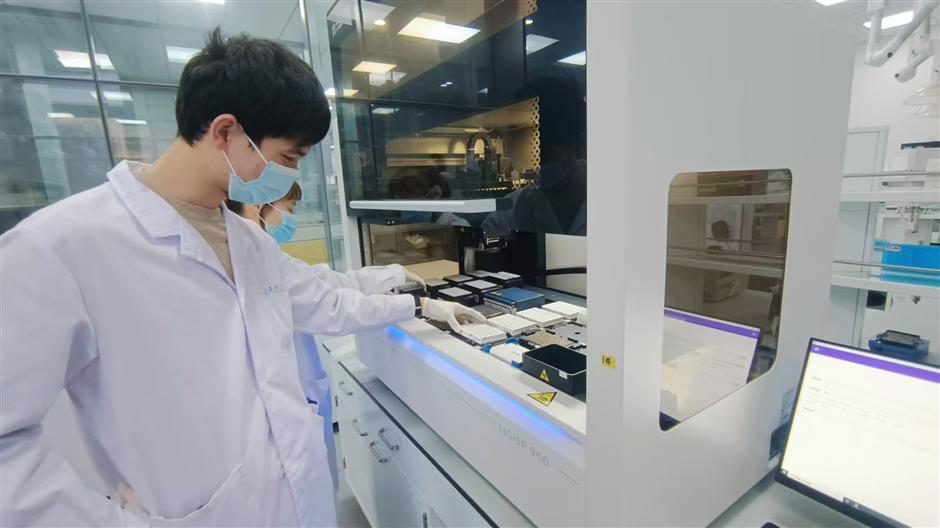政府新闻
医院向世界开放庞大的生物数据库 2024-11-15
Shanghai's Ruijin Hospital is opening its nearly 20-year-old biological database to the world for joint efforts to combat the disease. Thursday is World Diabetes Day,
ChinaMAP (the China Metabolic Analytics Project) is a national cohort study led by the hospital's endocrinology department and the National Clinical Research Center for Metabolic Diseases.
It has built a biobank with samples of 3 million people, including 150,000 samples for diabetes research, 200,000 for cardiovascular metabolism and cancer research, 2.5 million from metabolic management research, 3,600 for minors with serious obesity research and 12,000 for diabetes combined with hypertension research.

Shanghai's Ruijin Hospital is opening its biological database to the world.
"With the mergence of big data and artificial intelligence, omics data are playing a key role in drug development. We want to open the database to the world for academic exchange and cooperation with professionals home and abroad to work together," said hospital president Dr Ning Guang.
Western omics platforms such as UK BioBank, deCODE, DiscovEHR were all established earlier than China and have made great achievements in disease mechanism and the detection of biomarkers for new drug development. But Western people's are different from those of Chinese, so discoveries based on Western people's genome do not suit Chinese very well.
Ruijin leads ChinaMAP, whose first phase has already covered 27 provincial regions and eight nationalities. It has become the most comprehensive genome database in China, offering support and guidance for clinical practice and basic research, experts said.
It now has abundant information on genomics, metabonomics, proteomics and gut microbes as well as phenotypic information for over 1,500 diseases with over a 10-year follow-up. Its final purpose is to collect over 10,000 omics, phenomic and disease information with over 2,000 trillions pieces of data.
"The database will become the top scientific research platform in Asia and one of the largest in the world. Supported by AI technology, we have detected several targets for new drug development and some discoveries will be transfer into products soon, as we have carried out discussion on cooperation with world-leading pharmaceutical companies," said Dr Wang Weiqing, director of Ruijin's endocrinology department.

Professionals carry out research based on samples at the biobank.
China home to greatest number of diabetics
There are nearly 540 million people with diabetes around the world. In China, about 130 million adults have the disease and its incidence is 21.6 among local residents over 35 years old. But over 40 percent are not aware of their disease, posing serious challenges in prevention and control.
The Shanghai Health Commission said it has been building a comprehensive disease prevention and control network covering different levels of hospitals. Community-based ones are responsible for database, risk evaluation, patient management, intervention and education, while those at district and city level offer instruction to grassroots doctors and handle patients with complicated conditions or who fail to control their glucose well.
By this year, the city had registered 2.22 million people with a high risk of diabetes to offer community-based management. A total of 153 chronic disease management centers have been established around the city for screening, education and lifestyle intervention.
On Wednesday, the Shanghai Health Promotion Center launched the final of a competition to showcase elderly people's healthy and energetic lives through good mental and physical condition as well as active social involvement to promote proper lifestyles, chronic disease prevention and control, and healthcare.
A total of 50,000 elderly people took part in the competition that tested their knowledge of diet and nutrition, healthcare, and mental health, promoting their awareness of public health issues, officials said.

Two participants in a Shanghai Health Promotion Center competition promoting healthy lifestyles in elderly people.
Ill health, chronic diseases, and disability are problems for many elderly people in China with diabetes one of the most prevalent chronic diseases among the nation's middle-aged and elderly.
Poor control of chronic diseases can cause a continuous decline in bodily functions and quality of life, raising the risk of more diseases and infections such as flu, pneumonia and shingles.
"The incidence of diabetes in China has risen from 9.4 percent in 2007 to the current 11.7 percent and there is still a rising tendency. China is home to the largest number of diabetics in the world," said Dr Guo Xiaohui from Peking University First Hospital. "Diabetes can result in abnormal metabolism, cause microvascular complications and drop immunity. Diabetics are more vulnerable to infectious diseases like flu and shingles, while the infection also worsens glucose control and life quality."
Diabetes is closely related to lifestyles. Controlling glucose should be part of daily life and following doctors' advice is crucial.
"Patients undergoing supervision at the over 1,000 metabolic management centers (MMC) in the nation have seen a good improvement their data. Patients with qualified levels of glucose, blood pressure and blood fat have risen from 6.4 percent to 19 percent after our efforts in the past five years," said Wang Weiqing of Ruijin Hospital, which initiated the MMC program.
Source: Shanghai Daily
